
fno.org
|
|
| Vol 19|No 4|May-June 2010 | |
| Please feel free to e-mail this article to a friend, a principal, a parent, a colleague, a teacher librarian, a college professor, a poet, a magician, a vendor, an artist, a juggler, a student, a news reporter or to anyone else you think might enjoy it. | |||||||||||||
Studying Complex Concepts such as Beauty, Truth and Courage in DepthBy Jamie McKenzie, ©2010, all rights reserved.About author Sadly, we live in times when many people thirst for simple solutions to complex problems and elect politicians eager to give them what they seek. This thirst leads to misguided educational policies overemphasizing testing and experimental reform efforts. It leaves governments unable to regulate the banking industry in ways that make sense. |
 © Jamie McKenzie, all rights reserved. Life presents baffling puzzles and mysteries that deserve careful thought and consideration, but many folk have neither the patience nor the skill to invest in such probing. |
||||||||||||
|
Unless we raise citizens who appreciate the value of entertaining complexity, the health of the democracy is threatened as voters swing from one scheme and schemer to another with the volatility of the stock markets. In Empire of Illusion: The End of Literacy and the Triumph of Spectacle, Chris Hedges suggests that the majority of citizens have substituted fantasy and entertainment for reality. |
|||||||||||||
| The Limitations of Dictionary Learning In George Orwell's 1984, the leaders hoped to reduce the vocabulary of the proles to fewer than one thousand words. In that way, they reasoned, the citizens would not be capable of crimethink.
I grew up memorizing the meaning of words from dictionaries so I could score well on the SAT verbal test and gain entrance to Yale. My understanding of these words was meager. I could pick the right multiple choice and perform analogies, but my comprehension was superficial, at best. |
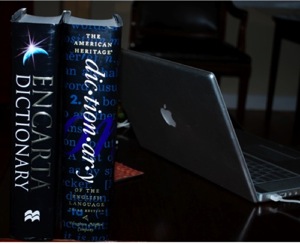
There are dozens of concepts such as beauty, courage, truth, honor and originality that are deserving of a different approach — one that deepens and extends the students' understanding so they can appreciate more fully the nuances and rich possibilities of such words. This understanding will serve them well as they ponder great works of literature as well as the challenges of their own times. |
||||||||||||
 Reproduced here from the Visual Thesaurus with permission from Thinkmap, Inc. Reproduced here from the Visual Thesaurus with permission from Thinkmap, Inc. |
Limits of Dictionary Learning
Schools should prepare the young to value complexity and see its connection to understanding. This challenge is a matter of blending skill with attitude. Schools should combat what I have called in the past "Mentalsoftness" — lazy, superficial thinking. |
||||||||||||
|
|||||||||||||
| Some ideas and concepts take years to develop — even a lifetime!
Was Joan of Arc courageous? A "yes" answer may seem easy, but the concept of courage becomes more complicated when we ask, "Which demanded more courage from Joan, leading troops in battle, facing the judges at her trial or enduring her punishment?" It turns out there are many different kinds of courage. Which of the images shown below from the sculptures outside the Civil Rights Museum in Birmingham show the most courage? |
 |
||||||||||||
 |
As audiences have struggled with this question, differences are quick to surface, as one person sees the confrontation with police and dog daunting, while others vote for the conscious choice of jail requiring more courage. There is not a correct answer, obviously, but the process requires attention to definition.
Just what is courage? What are the signs? the traits? the degrees? |
||||||||||||
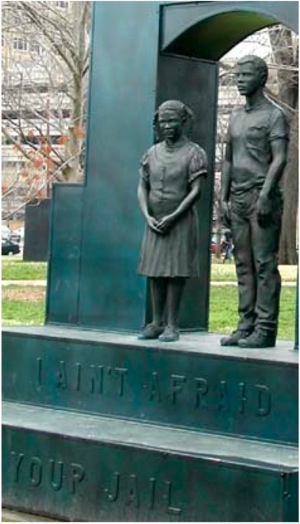 |
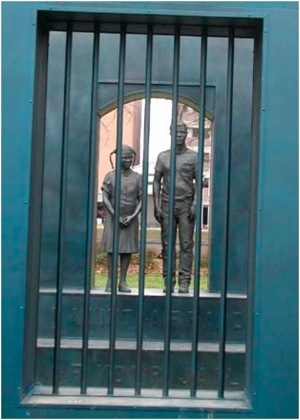 |
||||||||||||
| Orchestrating Provocative Lessons
The role of the teacher in such a unit is to orchestrate a series of learning experiences like the one above that begin to stretch the students' original thinking about the concept. After considering the Civil Rights images above, perhaps the teacher has the class view the Nike video below, asking, "How is the Nike view of courage different or similar to the types of courage we considered above? |
|||||||||||||
| “I got soul but I’m not a soldier!”
During these activities, students should be keeping track of their thoughts in some kind of journal, whether it be on a word processor or in mindmapping software. They will eventually accumulate several dozen statements that capture various aspects of courage.
Now that the students are intrigued, the teacher may send them to a quotation Web site such as ThinkExist.com to collect statements about courage by thinkers and famous people. In the diagram above, a student has found a quotation from Winston
The teacher urges students to collect several dozen quotations with a special emphasis upon those that stretch their original thinking into new domains.
After collecting quotations, perhaps the teacher asks the students to collect photographs or paintings that show various types or aspects of courage. They go to Google Images and find quite a diverse collection. Following this image collecting, the teacher asks the students to listen to "Courage is . . ." by the Strange Familiar at http://www.myspace.com/thestrangefamiliar and consider how the lyrics add to their understanding:
Student Contributions At some point the teacher invites students to add their own discoveries to the class experience.
Responding to this challenge, one student finds a chilling video on YouTube - Virginia Tech - Courage Under Fire. This video keeps the class occupied for an entire period as students try to fathom the kind of spirit and life experience that would inspire the sacrifice made by Dr. Librescu. Another student makes the class aware of a book and a movie, "The Sweet Hereafter" with a song by Sarah Polley covering The Tragically Hip's song — "Courage." This leads the class to get copies of Russell Bank's novel and to view the film.
Some students follow the lead of the Tragically Hip and read about Hugh MacLennan, the Canadian novelist and teacher to whom the song was dedicated. Expanding the List of Related Words and Concepts While the inquiry began with courage as the focus, the group has been collecting related words as they appear and has been seeking them out with tools like the Visual Thesaurus.
Assessment There are a number of tasks that will challenge students to demonstrate their grasp of the concept's complexities.
|
|||||||||||||
|
Copyright Policy: Materials published in From Now On may be duplicated in hard copy format if unchanged in format and content for educational, nonprofit school district and university use only and may also be sent from person to person by e-mail. This copyright statement must be included. All other uses, transmissions and duplications are prohibited unless permission is granted expressly. Showing these pages remotely through frames is not permitted. |
|||||||||||||
Outline of chapters and description of book available here.
Order your copy of The Media Literacy Toolbox from the FNO Store

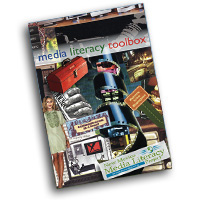

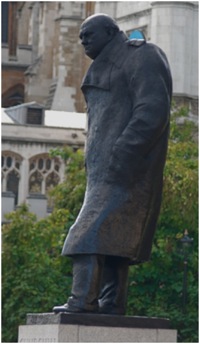 Churchill and has attached his name to the Quotations cluster.
Churchill and has attached his name to the Quotations cluster. 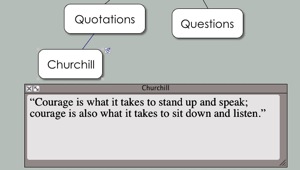
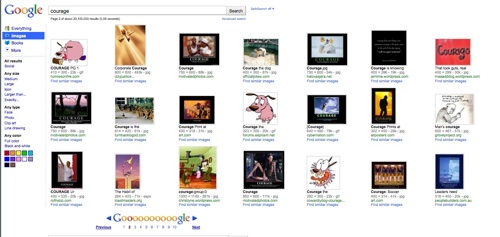

 How does bravery differ from courage? If someone is fearless are they capable of courage?
How does bravery differ from courage? If someone is fearless are they capable of courage?


